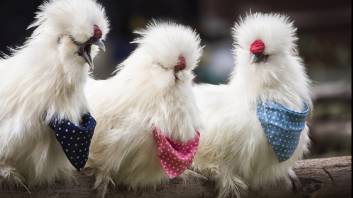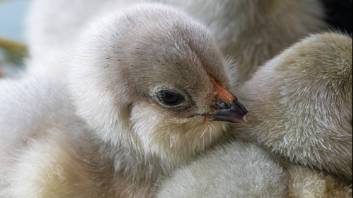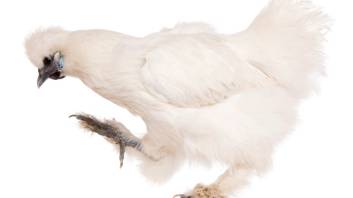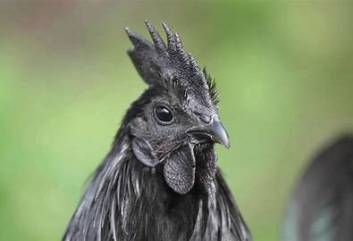
Order a Test Now
DNA Sexing
When Is It Useful To Use DNA Sexing For Your Chickens.
Accurate Chick Sexing for Better Flock Planning
When raising chickens like Rhode Island Reds, Plymouth Rocks, Australorps, Orpingtons, Wyandottes, Marans, Brahmas, and Silkies, determining the sex of day-old chicks can be tricky and inaccurate. The fluffy, solid-colored chicks lack the distinctive sexual dimorphism seen in other breeds. But our DNA sexing service uses a simple lab test to accurately identify cockerels from pullets.
Knowing the sex of your chicks from hatching provides huge benefits for planning and managing your flock. By determining the sex through our DNA analysis, you can:
- Plan housing needs accurately - Separate cockerels from pullets into the proper brooding areas and calculate coop space requirements for growth. No more guessing!
- Choose the best birds for breeding - Identify and select the top pullets and cockerels for your breeding program early.
- Avoid over-crowding issues - Cull excess males humanely before they mature and cause injuries through aggressive behavior.
- Maximize feed efficiency - Tailor feed for optimal growth and health, without wasting resources on the wrong sex.
- Sell chicks confidently - Customers will appreciate sexed chicks so they know what to expect as the birds mature.
Our DNA sexing is fast, reliable, and affordable. We use PCR analysis to identify the W chromosome present only in females. Results are over 99% accurate.
Simply send us your samples and we'll send back the certified sex analysis document identifying males and females within 2-4 business days.
Know your flock from the start for better planning and performance. Contact us today to sex your chicks through our DNA testing services!

DNA Sexing Tests Using Blood, Feathers or Egg Shells - $15.99 - 17.99
Blue Egg Gene Test
Why would you want to do a Blue Egg Gene Test?
A blue egg gene test in chickens is typically done for breeding purposes and to predict the egg color that a chicken will lay. Chickens lay eggs in a variety of colors, including white, brown, and blue. The blue egg color is determined by a specific gene known as the "Oocyan" gene. This gene causes the chicken's body to secrete a blue pigment called oocyanin onto the eggshell as it is being formed.
Here are a few reasons why someone might want to do a blue egg gene test in chickens:
The test can help predict the color of eggs a chicken will lay before it starts laying eggs. This can be particularly useful for breeders who are selling chickens based on the color of eggs they produce.
The blue egg gene test can also be used for genetic research purposes. It can help researchers understand the genetics of egg color and how genes are passed from one generation to the next.
Some rare breeds of chickens, like the Araucana, are known for laying blue eggs. Testing for the blue egg gene can help in efforts to preserve and propagate these rare breeds.
Blue eggs are often more appealing to consumers due to their unique color, so commercial poultry farmers might want to breed chickens that lay blue eggs to increase their market appeal.
In conclusion, a blue egg gene test in chickens is a valuable tool for breeders, researchers, and commercial farmers alike. It allows for more informed breeding decisions, contributes to genetic research, aids in the preservation of rare breeds, and can potentially enhance market appeal.
Lavender Test
Why would you want to run a Lavender Test
Here are a few reasons why a chicken breeder might want to do a lavender test:
- To identify lavender chickens in their flock. The lavender gene causes chickens to have a distinctive lavender or self-blue coloration. Doing a test can help the breeder identify which birds carry this gene.
- To breed lavender chickens. If a breeder is intentionally trying to produce lavender colored birds, testing can help them select breeding stock that will pass on the lavender gene.
- To avoid breeding lavenders. Some breeders may want to avoid producing lavender chickens, either because the color is undesirable or to maintain breed standards. Testing helps identify which birds should not be bred together.
- To track inheritance. The lavender color is recessive, so a bird can carry the gene without displaying the phenotype. Testing allows the breeder to track which birds are carriers even if they aren't visibly lavender themselves.
- For genetic diversity. Lavender is a relatively new mutation in chickens. Breeding lavenders can increase genetic diversity by introducing a new trait into a flock's gene pool. Testing helps enable this.
So in summary, lavender testing allows breeders to intentionally produce, avoid, or track inheritance of the lavender color in their flocks according to their breeding goals. The ability to identify carriers is especially useful for managing recessive traits like lavender plumage.
Recessive White Gene Test
Why would you want to do a Recessive White Gene Test?
Here are a few reasons why someone might do a recessive white gene test in chickens:
- To identify carriers of the recessive white gene. This gene prevents the deposition of melanin, resulting in pure white plumage. Breeders may want to identify which birds carry this gene so they can breed for more white chickens.
- To avoid mating two carriers together. If two chickens who carry the recessive white gene are mated, 25% of their offspring will be completely white and lack pigmentation. Breeders may want to avoid this to reduce health issues associated with complete lack of pigment.
- For breeding programs focused on producing white chickens. Testing can help identify the best parent stock for producing white chicks efficiently.
- To understand genetics and inheritance. Testing for specific genes like the recessive white allows breeders and geneticists to better understand how traits are passed on in chickens.
- For research purposes. Scientists may study the effects of the recessive white gene and how it inhibits melanin production.
So in summary, recessive white testing allows for more control and efficiency in breeding for white plumage, while also serving to further scientific understanding of genetics. For chicken breeders focused on color, it's a useful tool.
Fibromelanosis (FM)
Why would you want to do a Fibromelanosis (FM) Test?
Testing for fibromelanosis in chickens is useful for several reasons:
1. **Breed Identification and Preservation**: Fibromelanosis is a key trait in certain chicken breeds, such as the Silkie, Svarthöna, and Ayam Cemani. Testing helps confirm the presence of this trait, ensuring the purity of the breed and assisting in preservation efforts for these unique genetic lines.
2. **Selective Breeding Programs**: Understanding which chickens carry the genes for fibromelanosis allows breeders to selectively breed birds that either express or do not express the trait, depending on their breeding goals. This can be important for producing chickens with specific desired characteristics.
3. **Genetic Research**: Studying fibromelanosis can provide insights into the genetic mechanisms behind pigmentation and other related traits. This research can contribute to a broader understanding of genetics, which could have applications in other areas of animal science and even medicine.
4. **Health Monitoring**: While fibromelanosis itself is a cosmetic trait, testing can sometimes be part of broader genetic screening programs that monitor the overall health and genetic diversity of chicken populations. This can help in identifying any potential genetic issues that might be linked to the trait.
5. **Conservation of Genetic Diversity**: By identifying and understanding the genetic basis of fibromelanosis, efforts can be made to conserve this unique trait and the genetic diversity it represents within the chicken population. This is important for maintaining a wide range of genetic resources in agriculture.









